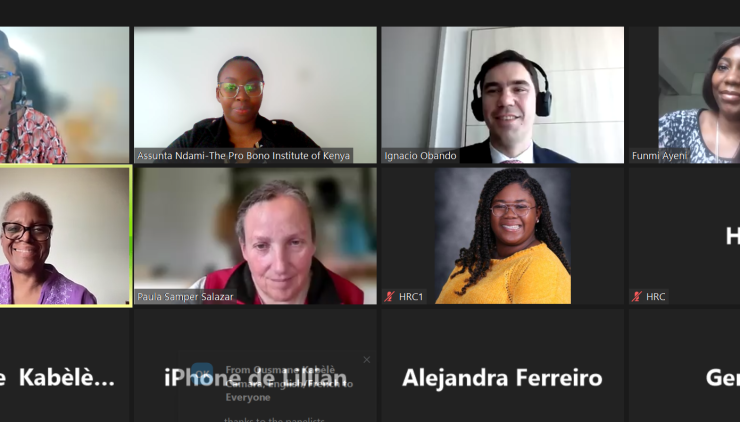The Vance Center’s Africa Program hosted a session during the annual event, aiming to build on the platform of the conference to highlight and introduce resources available through the clearinghouse model to a broader sector of the legal community in Africa.
Africa Program Director Adaobi Egboka moderated a panel during the 2023 Joint Convening of the Social Practice of Human Rights Conference and the 6th International Conference on the Right to Development, held on November 2-4. The hybrid conference, which also marked the 75th anniversary of the Universal Declaration of Human Rights, was hosted by the University of Dayton Human Rights Center in collaboration with the Centre for Human Rights at the University of Pretoria Faculty of Law, and the Free State Centre for Human Rights at the Faculty of Law, University of the Free State, both in South Africa.
The three-day event, centered on the theme “Decolonization and Development for Africa and People of African Descent,” included keynote speakers, plenaries, workshops, and roundtable sessions featuring a wide range of scholars, practitioners, activists, and organizers across disciplines and continents.
In response to a call for proposals, the Vance Center’s Africa Program had successfully pitched a session focused on clearinghouses and other models for strengthening access to justice. On November 3, Egboka led a roundtable titled “Advancing Access to Justice in Sub-Saharan Africa and Latin America: Innovative Strategies and Methods,” which examined how pro bono practice and clearinghouse models from three countries in Africa and Latin America support access to justice, good governance, and rule of law.
The discussion included panelists Funmi Ayeni, Executive Director of the Lagos Public Interest Law Partnership in Nigeria; Teresa Yates, former National Director of ProBono.org in South Africa; Assunta Ndami, coordinator of the Pro Bono Institute of Kenya; Ignacio Obando, co-coordinator of the Pro Bono Network of the Americas and representative of Fundación Pro Bono in Chile; and Paula Samper Salazar, partner at Gómez-Pinzón Abogados and founding member of Fundación Pro Bono Colombia.
The panelists highlighted how they have effectively coordinated collaborations between law firms, in-house counsel, academic institutions, and NGOs, and have used public-private partnerships to create hubs to support access to justice in their countries. Through the discussion, participants analyzed the benefits and challenges of collaborative structures, and emphasized how these joint efforts between pro bono actors can effectively strengthen access to justice.
The roundtable concluded with speakers emphasizing the key role of clearinghouses. They underscored how clearinghouses are critical for mobilizing and supporting the next generation of legal practitioners to develop a culture of pro bono culture through their legal education, with the goal of expanding access to justice for marginalized groups.



